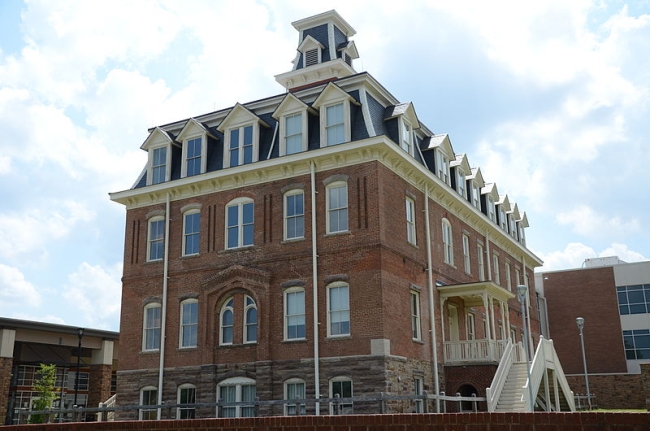You have /5 articles left.
Sign up for a free account or log in.

Arkansas Baptist College
Wikipedia
Arkansas Baptist College made an unusual announcement last week about the coming fall semester: it will be free.
Tuition, room and board will be covered. For only the first 500 students, of course, but enrollment at the private, historically Black college in the spring was 361 students, so the college expects to cover all students.
How can a college that is not wealthy at all (total endowment is less than $1 million) afford to adopt such a strategy? And with the offer only for a semester, will Arkansas Baptist hold on to the new students it gets? And why is a college unveiling its strategy for the fall semester when it's almost July?
To qualify for the grant, students (freshmen or continuing students) must do three things: complete the admissions process (for those who aren't students), file the Free Application for Federal Student Aid and register for classes. That's it, and the college generally admits those who apply. No essay on the application. No minimum grade requirements.
Carlos R. Clark, president of Arkansas Baptist, says one thing that's important to remember is that the college (and many private colleges) typically fills its classes now, not in April and May. Most of the students live within a two-hour drive of Little Rock. In addition to Arkansans, the college gets some students each year from Georgia, Louisiana and Tennessee.
Many private colleges, he said, serve students similarly situated in their states or nearby.
The idea that "free" will attract students is of course not unique to historically Black colleges. Many community colleges have free programs, and some states have made community college free. President Biden has proposed a national program of free community college (and some four-year public colleges). Some private colleges, as well, have embraced the idea -- for low-income students. Grace College, in Indiana, this week said it would be free (for tuition) for any student with an expected family contribution of $1,500 or below on the FAFSA.
The idea -- very much endorsed by Clark -- is that the word "free" is very powerful with low-income students, more powerful than "there is lots of aid we give out."
He is also trying to build (in a slightly different way) on a trend in which historically Black colleges have announced this year, at commencement, that they would clear part or all of the balances owed in tuition, fees and fines. He noted recent reports on the total owed in student debt in the U.S. ($1.7 trillion) and said colleges need to do something. While other historically Black colleges have acted at the end of a college education, Clark said he wanted to act at the beginning and perhaps encourage more students to enroll.
So where does the money come from? The program will cost around $2.5 million, based on Arkansas Baptist's tuition, room and board of $9,093 per semester.
The largest source of dollars is federal. The college will be using $1.35 million in federal aid for coronavirus recovery. Then there is a special $1 million appropriation from the state. The rest will be covered by the federal student aid for which students are eligible. (More than 80 percent of students are eligible for Pell Grants.) Clark noted that the state appropriation just happened, adding to his rationale for announcing the plan just last week.
Average debt of students at Arkansas Baptist is about $25,000 -- less than the national averages, but a large sum for his students.
The plan "is the right thing to do," he said.
Clark noted that the college is focused not just on traditional freshmen, but on students who have dropped out of college (not necessarily from Arkansas Baptist) without earning a degree. For students who are just a semester short, a free semester could make all the difference, he said.
Will the Plan Work?
Experts on admissions said they liked the ideas behind the plan. But they cautioned that Arkansas Baptist could face a problem if people associate the college with "free" -- permanently.
Rick Hesel, a principal with Art & Science Group (which advises colleges on admissions strategies, but does not have Arkansas Baptist as a client), said, "It's a great idea when you look at the population that the college serves."
But he noted that the college is using COVID-19 funds for this program -- funds that are unlikely to be available in the future. "It may create an expectation in the marketplace in terms of what it costs," he said. He urged Arkansas Baptist to "say that this is for one semester only" in a way that students and their families will notice.
Don Hossler, senior scholar at the Center for Research Policy and Practice of the Rossier School of Education at the University of Southern California and provost professor emeritus at the School of Education of Indiana University Bloomington, also said the question isn't whether it will work this year, but what it will do to recruitment next year. "Do schools have a plan to continue this kind of aid award?" Hossler said. "If not, are they carefully working with families to ensure that they can realistically afford the costs over the course of their academic career? If not, many of these students will not be able to continue or they, and their parents via Plus Loans, my rack up substantial debt loads. It is potentially a bait-and-switch strategy."
Clark acknowledged that the plan has risks, but he said the prospect of reaching students he wouldn't reach otherwise justified it.
Since the program was only just announced in the middle of last week, it's too early to know if it will succeed. But Clark said there have been lots of calls from interested would-be students.




